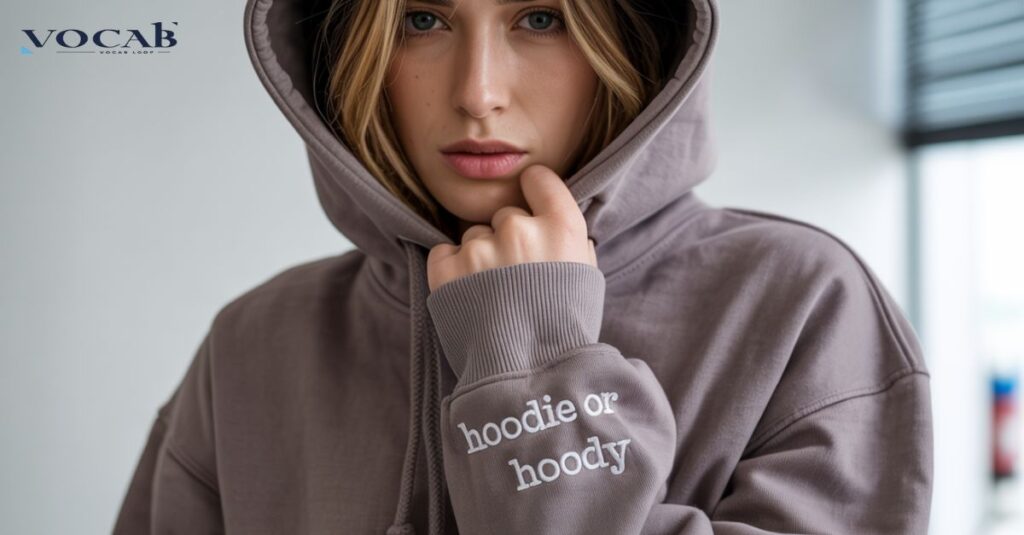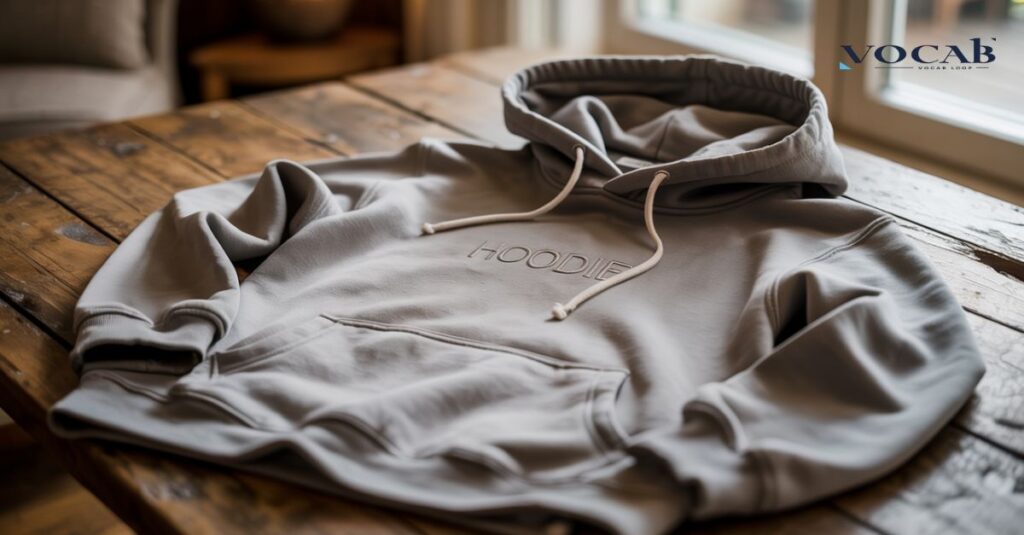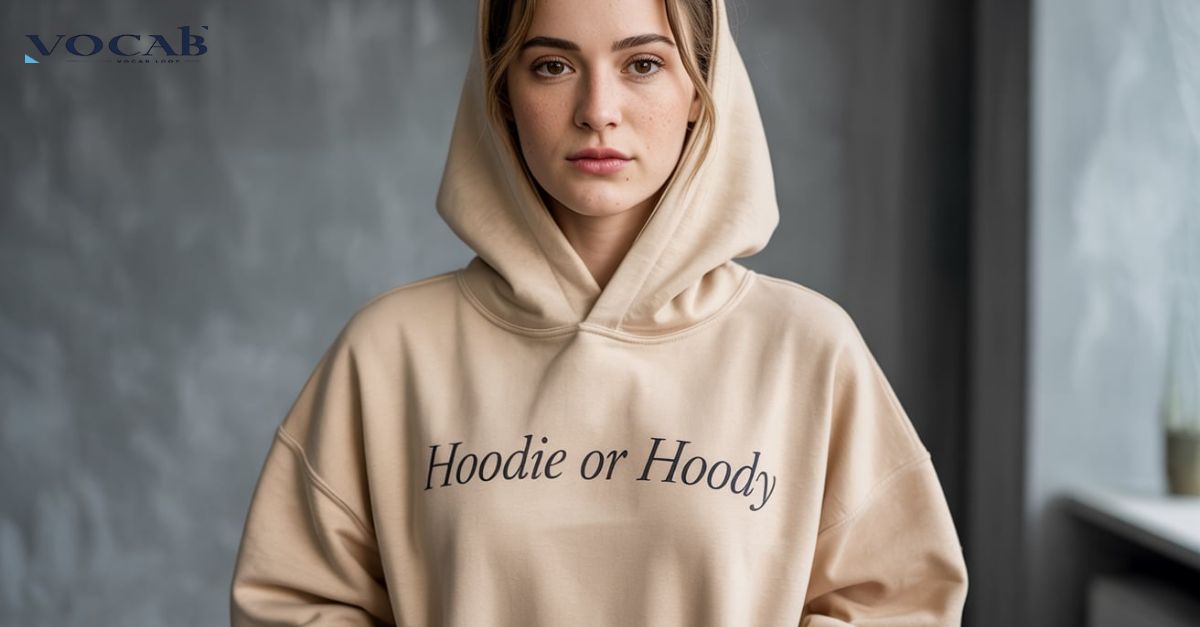In American English, both hoodie and hoody refer to the same piece of comfortable outerwear—a sweatshirt with hood that’s perfect for layering in chilly weather. Whether you’re grabbing a pullover hoodie for a lazy Sunday or zipping into a zip-up hoodie before a workout, these garments are everyday essentials. But have you ever stopped to wonder why the word has two spellings?
The answer lies in regional preferences and language evolution. While hoodie is the more common U.S. spelling, hoody occasionally appears in informal or creative contexts. This article breaks down the spelling, usage, and cultural influences behind both versions to help you choose the right one confidently.
What Does Mean of Hoodie
A hoodie is a type of hooded sweatshirt that is soft, warm, and casual. It usually has long sleeves, a hood at the back, and sometimes a front pocket. This item is common in cold weather clothing, loved for comfort and warmth. You’ll find a pullover hoodie or a zip-up hoodie, depending on the style you prefer.
In the USA, the hoodie is very popular. It’s seen in schools, gyms, homes, and even some workplaces. This comfortable outerwear is a big part of streetwear fashion and everyday outfits. People wear it while jogging, shopping, or just relaxing. It’s a classic piece of casual clothing in American wardrobes.
What Does Mean of Hoody
The word hoody is a hoody variant of the word hoodie. Both spellings refer to the same piece of clothing—a sweatshirt with hood. However, hoody is not as commonly used in the United States. It appears more often in British or Australian writing, making it part of English variants (American, British, Australian).
While hoodie is found in stores, product tags, and major websites, hoody may be used in novels, informal chats, or personal blogs. The meaning is the same, but the spelling gives a slightly different look or feel. Fashion spelling differences like this often show how culture and region influence language.
Quick Summary between Hoodie or Hoody
The terms hoodie and hoody both point to the same type of clothing. There is no difference in pronunciation, use, or function. What makes them different is the spelling and how often they are used in different places.
In short, hoodie is the U.S. standard, used in fashion, stores, and hoodie in formal writing. Hoody, on the other hand, is a less common spelling. It might appear as a stylistic choice or in certain English variants (American, British, Australian), especially outside the U.S.
Pronunciation of Hoodie or Hoody aling
Whether you say hoodie or hoody, the sound is exactly the same: “/ˈhʊdi/.” The ending sounds like the word “tea.” There’s no change in tone or stress between the two.
This is important because spelling changes don’t always affect how a word sounds. In this case, the spelling may shift, but the spoken word remains the same. Both words are said quickly and often in informal conversation, especially as a slang shortening of “hooded sweatshirt.”
Spelling and Visual Cues of Hoodie or Hoody

When written down, the difference between hoodie and hoody becomes clear. Hoodie is the version seen on fashion tags, product pages, and retail shelves in the U.S. It looks polished and familiar in branding and marketing.
The hoody variant, however, has a softer look. It might feel more personal or casual. Sometimes, writers pick this version to stand out or to match local spelling styles. But in most American settings, people stick with hoodie because it’s the more recognized form, and even dictionaries show a strong dictionary preference for hoodie.
Key Difference between Hoodie or Hoody
The biggest difference between hoodie and hoody is spelling. Meaning, use, and look are all the same. The word hoodie is used more in American English, while hoody is seen in the UK or creative texts. Both are correct, but hoodie is the most accepted version.
Writers, brands, and fashion sites in the U.S. use hoodie for all descriptions, especially when talking about casual vs formal usage. You’ll rarely see hoody in American ads or catalogs, even though it means the same thing.
Comparison Table between Hoodie or Hoody
| Feature | Hoodie | Hoody |
| Popularity | Very high in USA | Rare, seen in UK/creative |
| Used in | Retail, branding, fashion | Blogs, informal writing |
| Accepted by dictionaries | Yes, preferred spelling | Sometimes listed as alt. |
| Visual appeal | Modern, polished | Soft, stylized |
| Region | American English | UK and Australia |
Common Mistakes in Hoodie or Hoody
Some writers mix both spellings in the same article or product listing. This makes the text look sloppy or unedited. Stick to one spelling—preferably hoodie if your audience is American. This helps your writing feel clean and professional.
Another mistake is using the plural of hoodie wrongly. The correct form is hoodies, not “hoodys.” Remember, in English, when a word ends in “y” and the letter before it is a vowel, we simply add “s” to make it plural. That’s part of pluralization rules.
Formal vs Informal Usage of Hoodie or Hoody

In product descriptions, fashion blogs, or business settings, hoodie is the better choice. It’s seen in major stores like Nike, Gap, or Adidas. This makes it suitable for both formal and informal wear references.
Hoody can work in fiction, poems, or stylized branding. If you want your brand to sound unique or different, this hoody variant might help. Still, for most American readers, hoodie in formal writing is easier to understand and more familiar.
Usage in Different English Varieties Hoodie or Hoody
In American English, hoodie is the go-to word, in British English, you might see both hoodie and hoody, though hoodie is still more common or in Australian English, casual use of hoody appears, but not often in professional writing.
Each region has its own preferences, and this creates slight spelling differences. These English variants (American, British, Australian) reflect how culture affects language—even for a basic word like hooded sweatshirt slang.
Simple Trick to Remember the Difference of Hoodie or Hoody
A good memory tip is: if you’re in the U.S., always go with hoodie—think of it as “E for Everywhere in America.” The hoody variant is more like a niche or local spelling.
Also, picture this: a hoodie is what you’d find in your favorite store, printed in bold letters on tags. A hoody might show up in a book or niche blog. This trick can help you remember when to use hoody versus hoodie.
Examples in Sentences of Hoodie or Hoody
Hoodie:
- I bought a new hoodie from the mall.
- She wears her favorite hoodie every winter.
- His gray hoodie has a kangaroo pocket.
- That drawstring hoodie looks warm and stylish.
- I love this zip-up hoodie for workouts.
- He forgot his hoodie at school.
- The movie hero wore a black hoodie.
- I packed a hoodie for the camping trip.
- My old hoodie is so cozy.
- She ordered a red pullover hoodie online.
Hoody:
- He pulled the hoody over his head.
- I saw a cool hoody in a UK fashion mag.
- That hoody has funny cartoon prints.
- She knit a soft hoody for her dog.
- The brand uses the word hoody instead of hoodie.
- My brother loves that navy hoody.
- I got this hoody from an indie store.
- They wear the same hoody every weekend.
- He launched his clothing line with just one hoody.
- That writer always uses the spelling hoody in books.
Synonyms of Hoodie or Hoody
Hoodie:
- hooded sweatshirt
- pullover hoodie
- zip-up hoodie
- comfortable outerwear
- casual clothing
- fleece top
- athletic jacket
- sweatshirt jacket
- thermal top
- activewear hoodie
Hoody:
- sweatshirt with hood
- drawstring hoodie
- kangaroo pocket top
- street jacket
- lightweight sweatshirt
- fashion pullover
- hoodie top
- zipped hoody
- softshell hoody
- snug sweatshirt
Origins of Hoodie or Hoody
Hoodie:
The word hoodie comes from the root “hood,” which dates back to the 12th century. It evolved from “höd” in Old English. In the 1930s, the hooded sweatshirt became popular in New York. It was used by warehouse workers to stay warm. Over time, hoodie origin moved into sportswear, and later, into music and streetwear fashion.
By the early 2000s, the hoodie became a global icon, thanks to brands like Champion and celebrities who made it cool. Today, it’s a symbol of youth, comfort, and even quiet rebellion.
Hoody:
The spelling hoody likely appeared as a slang shortening or creative twist in English. It may have popped up in UK writing or music as a soft variation of hoodie. There’s no exact year when it began, but it has existed in print since at least the 1990s.
While not the main spelling, the hoody variant still holds charm. Writers and small fashion labels sometimes choose it to sound unique or different. But it remains secondary to the more dominant hoodie popularity in mainstream use.
Fun Fact about Hoodie or Hoody
Did you know that Mark Zuckerberg of Facebook helped make the hoodie a symbol of tech culture? He wore one so often that it became part of his brand. Today, the hoodie is seen as both a relaxed and smart choice in Silicon Valley. Also, many colleges print their logos on hoodies, making them a student favorite.
There’s even debate in online forums about which spelling is “cooler”—hoodie or hoody. In the end, both keep you warm, so maybe the real answer is: wear what you love!
FAQ’s
Which spelling is correct: hoodie or hoody?
Hoodie is the standard spelling; hoody is a less common variant.
Is there a difference between hoodie and hoody in terms of style?
No, both words describe the same hooded sweatshirt style.
Can I use the word hoody in formal writing?
Use hoodie in formal writing—hoody is better for casual use.
Why do people use two different spellings?
The variation comes from English variants, brand choices, and slang shortening.
What is the plural of hoodie or hoody?
The plural of hoodie and hoody is the same: hoodies.
Conclusion
To sum it up, hoodie and hoody mean the same thing. They both describe a warm, soft hooded sweatshirt worn for comfort and style. The real difference is how the words are spelled. Hoodie is the popular American version, found in shops, ads, and formal writing. Hoody is a lesser-used hoody variant, mostly seen in the UK or informal writing.
No matter how you spell it, a hoodie is a cozy friend in your closet. So next time you reach for your favorite sweatshirt with hood, you’ll know exactly which term fits—and how to use it like a language pro.

Alex Hormozi is a seasoned blogger at Vocab Loop, known for his deep insights into language, vocabulary, and grammar. With years of experience in writing, Alex shares practical tips and effective strategies to help readers improve their linguistic skills and enhance their writing abilities.

